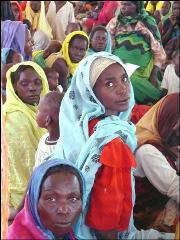Sudan’s Darfur crisis prompts calls for world to act
NAIROBI, May 24 (AFP) — More than a year after the seeds of its current humanitarian catastrophe were sown, calls for robust international action in the war-ravaged Sudanese region of Darfur and pressure on Khartoum are finally mounting.
The last week has brought warnings of mass starvation, reminders of widespread human rights atrocities, accusations of ceasefire violations, veiled threats of United Nations sanctions, and a call for international military action.
 Monday delivered a rare glimmer of good news, with an announcement by British charity Oxfam that it would expand its operations in Darfur, where at least 10,000 people have been killed since rebels rose up in February 2003 — prompting an all-out assault by government forces and their militia allies — and where two million are deemed by the United Nations to be adversely affected by the conflict.
Monday delivered a rare glimmer of good news, with an announcement by British charity Oxfam that it would expand its operations in Darfur, where at least 10,000 people have been killed since rebels rose up in February 2003 — prompting an all-out assault by government forces and their militia allies — and where two million are deemed by the United Nations to be adversely affected by the conflict.
Oxfam’s somewhat tentative plans followed Khartoum’s announcement last week that it would lift travel restrictions on aid workers in the region.
“I hope this new move will mean that our water engineers can finally get to the Darfur region and to remote communities where people need urgent help,” Oxfam regional director Caroline Nursey said in a statement.
Food is one of the most pressing concerns for Darfur’s estimated six million inhabitants, with mass displacement having preventing this year’s crops being harvested before the imminent rainy season.
Oxfam pointed out that, every year, Darfur goes through a cyclical “hunger gap” from April until harvest-time in October.
UN agencies and other aid workers have accused militia forces of ethnic cleansing, systemised starvation, killing, rape and pillage.
About 120,000 civilians have fled west, across the border to Chad, where humanitarian facilities are far from adequate.
The rebels and Khartoum signed a “humanitarian ceasefire” on April 8, but the fighing has continued, while military observers provided for in the accord have yet to be sent.
The crisis does not figure in almost-complete peace talks in Kenya between Khartoum and the country’s main rebel group, the Sudan People’s Liberation Army/Movement.
On Sunday, one of the two rebel groups active in Darfur, the Sudan Liberation Movement (SLM), accused the pro-government Janjaweed militia of killing 45 people in an attack on the village of Abquarajel, in South Darfur, on Thursday.
The SLM claimed the attack took place after a meeting between President Omar al-Beshir and the Janjaweed chiefs in the state.
Beshir travelled to Nyala, South Darfur’s capital, on Wednesday and said he was determined to resolve the conflict, but denied widespread claims that African civilians were the target of a systematic campaign by the region’s Arabs.
“The international community must act urgently — and be prepared to use force if necessary — to save hundreds of thousands of civilians whose lives are at risk because of Sudan’s brutal counter insurgency in Darfur,” the International Crisis Group (ICG), an influencial think tank, declared Sunday.
ICG called for “immediate, focused action, especially from the UN Security Council, to stop the killings and widespread atrocities, prevent mass starvation, reverse ethnic cleansing, and encourage a peace process.”
“There is just enough time to save the hundreds of thousands of lives directly threatened by government-supported Janjaweed militias and looming starvation, but only if the world acts very urgently,” ICG advisor John Prendergast said in a statement.
On Friday, Washington brandished a heavy stick in Khartoum’s direction, with a State Department official warning that the US was pushing for a Security Council resolution that would “very possibly (provide for) some form of sanctions” if the Sudanese government failed to reign in the militias and improve humanitarian access.
